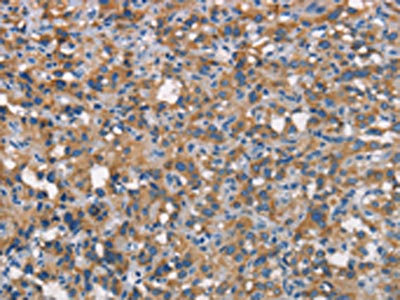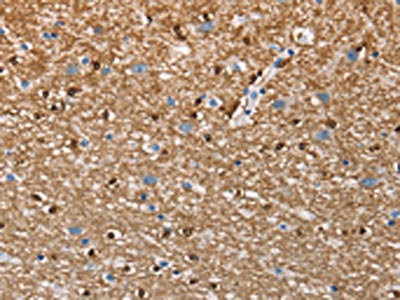CEACAM6 Antibody
-
货号:CSB-PA832895
-
规格:¥1100
-
图片:
-
其他:
产品详情
-
Uniprot No.:P40199
-
基因名:
-
别名:Carcinoembryonic antigen related cell adhesion molecule 6 antibody; Carcinoembryonic antigen related cell adhesion molecule 6 (non specific cross reacting antigen) antibody; Carcinoembryonic antigen-related cell adhesion molecule 6 antibody; CD 66c antibody; CD66c antibody; CD66c antigen antibody; CEA LIKE PROTEIN antibody; CEACAM 6 antibody; CEACAM6 antibody; CEAL antibody; CEAM6_HUMAN antibody; MGC93832 antibody; NCA antibody; Non specific cross reacting antigen antibody; Non-specific crossreacting antigen antibody; Normal cross reacting antigen antibody; Normal cross-reacting antigen antibody
-
宿主:Rabbit
-
反应种属:Human
-
免疫原:Synthetic peptide of Human CEACAM6
-
免疫原种属:Homo sapiens (Human)
-
标记方式:Non-conjugated
-
抗体亚型:IgG
-
纯化方式:Antigen affinity purification
-
浓度:It differs from different batches. Please contact us to confirm it.
-
保存缓冲液:-20°C, pH7.4 PBS, 0.05% NaN3, 40% Glycerol
-
产品提供形式:Liquid
-
应用范围:ELISA,IHC
-
推荐稀释比:
Application Recommended Dilution ELISA 1:2000-1:5000 IHC 1:50-1:200 -
Protocols:
-
储存条件:Upon receipt, store at -20°C or -80°C. Avoid repeated freeze.
-
货期:Basically, we can dispatch the products out in 1-3 working days after receiving your orders. Delivery time maybe differs from different purchasing way or location, please kindly consult your local distributors for specific delivery time.
相关产品
靶点详情
-
功能:Cell surface glycoprotein that plays a role in cell adhesion and tumor progression. Intercellular adhesion occurs in a calcium- and fibronectin-independent manner. Mediates homophilic and heterophilic cell adhesion with other carcinoembryonic antigen-related cell adhesion molecules, such as CEACAM5 and CEACAM8. Heterophilic interaction with CEACAM8 occurs in activated neutrophils. Plays a role in neutrophil adhesion to cytokine-activated endothelial cells. Plays a role as an oncogene by promoting tumor progression; positively regulates cell migration, cell adhesion to endothelial ...显示更多
-
基因功能参考文献:
- CEACAM6 promoted oral squamous cell carcinoma cell invasion, migration, cytoskeletal rearrangement, and metastasis via interaction with EGFR and enhancing it activation. PMID: 28892050
- Studies provide evidence that dysregulated overexpression of CEACAM6 plays a role in several of the hallmarks of cancer, including uncontrolled proliferation, anoikis resistance, immune evasion, invasion and metastasis. [review] PMID: 29110374
- Helicobacter pylori HopQ binds the amino-terminal IgV-like domain of human CEACAM1, CEACAM3, CEACAM5 or CEACAM6 proteins, thereby enabling translocation of the major pathogenicity factor CagA into host cells. PMID: 27748756
- Here, the s identify members of the carcinoembryonic antigen-related cell adhesion molecule (CEACAM) family as receptors of Helicobacter pylori and show that HopQ is the surface-exposed adhesin that specifically binds human CEACAM1, CEACAM3, CEACAM5 and CEACAM6. PMID: 27748768
- CD66c (KOR-SA3544) antigen expression of leukemic blasts in pediatric acute myeloid leukemia with TLS/FUS-ERG fusion transcript PMID: 28766906
- Data suggest that the expression of these TSPAN8, LGALS4, COL1A2 and CEACAM6 in the whole blood may be useful in the detection of colorectal cancer (CRC). PMID: 26993598
- expression is increased in severe asthma and primarily associated with airway epithelial cells and tissue neutrophils PMID: 28275137
- a 7-gene signature was identified which correctly predicted the primary prefibrotic myelofibrosis group with a sensitivity of 100% and a specificity of 89%. The 7 genes included MPO, CEACAM8, CRISP3, MS4A3, CEACAM6, HEMGN, and MMP8 PMID: 27579896
- In enterocytic C2BBe1 cells, Candida albicans caused a transient tyrosine phosphorylation of CEACAM1 and induced higher expression of membrane-bound CEACAM1 and soluble CEACAM6. PMID: 28292985
- Monoclonal Antibody 1B5A5 Against CEACAM6 PMID: 27328063
- western blot analysis results indicated that the 1B5A5 epitope is located within an amino-terminal domain of CEACAM6. These results raised the possibility that our approach could lead to discovery of novel biomarkers for the early stage of cancers in a relatively short period of time. PMID: 27172290
- show the upregulation of the tumor-associated antigens CEACAM5/6 by trans-signaling of the pro-inflammatory cytokine IL-6 PMID: 26673628
- Biliary CEACAM6 can identify patients with extrahepatic cholangiocarcinoma with a high degree of sensitivity and should be investigated further as a potential screening tool. PMID: 26974538
- Data suggest ways in which carcinoembryonic antigen-related cell adhesion molecules CEACAM6 and CEACAM8 regulate the biological functions of one another. PMID: 26483485
- CEACAM6 protein and mRNA were increased ~4-fold in lungs from infants with chronic lung disease as compared with controls. PMID: 26374831
- vaccination with recombinant attenuated Salmonella harboring the CEACAM6 and 4-1BBL gene efficiently increased the number of CD3+CD8+ TIL and NK cells, decreased the number of FOXP3 cells and inhibited the development of DMH-induced colorectal cancer PMID: 25872647
- CEACAM6 increased the levels of phosphorylated AKT, which is involved in the progression of a variety of human tumors. PMID: 25398131
- Data show that carcinoembryonic antigen-related cell adhesion molecule 6 (CEACAM6) and forkhead box P3 (FOXP3) are associated with the malignant degree of pancreatic cancer. PMID: 26271985
- Data indicate that carcinoembryonic antigen-related cell adhesion molecule 6 (CEACAM6) promotes angiogenesis in gastric cancer via focal adhesion kinase FAK signaling. PMID: 25703140
- Results show that pancreatic cancer patients with CEACAM 1, 5 and 6 expression showed a significantly shortened overall survival and elevated serum values are correlated with distant metastasis suggesting a role in epithelial-mesenchymal transition. PMID: 25409014
- CEACAM6 may be a valuable biomarker screening for gastric tumor and novel predictor for patients in advanced stages of gastric cancer PMID: 25299082
- results suggested that CEACAM6 functions as an oncoprotein in gastric cancer and may be an important metastatic biomarker and therapeutic target PMID: 24492534
- CEACAM6 expression was expressed in different molecular subtypes of breast cancer. Among different subtypes, the highest expression was found with HER2 positive cancers. PMID: 24186057
- High carcinoembryonic cell adhesion molecule 6 expression is associated with malignant biliary stenoses. PMID: 23806607
- our findings identified CEACAM6, which is regulated by miR-29a/b/c, as an important positive regulator of EMT in pancreatic cancer PMID: 23857344
- CD66c expression appears useful only as a predictor of the Ph in adult patients (not in pediatric cases). PMID: 24014076
- Data indicate that CD66c is frequently expressed in CRLF2-positive as well as hypodiploid cases. PMID: 24231528
- these findings show that PDEF-CEACAM6 is a highly active oncogenic axis in breast cancer PMID: 23592399
- CEACAM-6 plays an important role in the regulation of CD8+ T-cell responses against multiple myeloma. PMID: 23603913
- CEACAM6 is significantly upregulated in colon cancer tissues and is closely associated with poor prognosis. PMID: 22975528
- The expression of CD66c was significantly higher in colorectal cancer specimens than in normal colon. PMID: 23027178
- CEACAM6 is focally overexpressed in a large fraction of human HNSCCs in situ. over-expression of CEACAM6 increases tumour growth and tumour initiating activity by suppressing PI3K/AKT-dependent apoptosis of HNSCC in a xenotransplant model of HNSCC. PMID: 23021083
- High CEACAM6 expresssion is associated with inflammatory bowel disease. PMID: 21994005
- a novel role for NA in enhancing host cell survival by activating the Src/Akt signaling axis via an interaction with carcinoembryonic antigen-related cell adhesion molecule 6/cluster of differentiation 66c (C6). PMID: 22396546
- The s show that the expression of CEACAM1 and CEACAM6 potentiate CEACAM3-dependent responses of neutrophils, exposing a cooperative role for this family of proteins during neisserial infection of neutrophils. PMID: 22064717
- CEACAM6 is expressed by alveolar and airway epithelial cells of human lung and is secreted into lung-lining fluid, where fully glycosylated protein binds to surfactant. PMID: 22037359
- Despite its important role in bacterial attachment in ileal CD, no role was detected for CEACAM6 variants in IBD susceptibility or regarding an ileal CD phenotype PMID: 21559399
- The highly elevated gene expression of CEACAM6 and CEACAM8 in primary myelofibrosis can serve as molecular markers of myelofibrotic transformation. PMID: 21470677
- High serum CEACAM6 is associated with gastric cancer. PMID: 21618249
- CEACAM6 and a regulatory element near the 3' end of CEACAM3 are associated with cystic fibrosis disease severity and intrapair discordance PMID: 20047061
- Positivity for both leukemia-associated antigens CD66c and CD25 in combination can predict the presence of BCR/ABL rearrangement in pre-B cell acute lymphoblastic leukemia PMID: 20063526
- Overexpression of CEACAM6 disrupts tissue architecture and blocks colonocyte differentiation PMID: 11896570
- CEACAM6 subdomains involved in intercellular adhesion activity and subdomains involved in inhibition of cell differentation are identified and their respective activities are independently blocked. PMID: 12571231
- CEACAM6 gene silencing reversed the acquired anoikis resistance of tumor cell lines and inhibited in vivo metastatic ability PMID: 14724575
- overexpression among human malignancies, immunological targeting of this tumor antigen may have therapeutic applicability PMID: 15081416
- the results show that recognition of CEA and CEACAM6, but not CEACAM1, is accompanied by tight attachment to bacteria of cell surface microvilli-like extensions PMID: 15130118
- CEACAM6 is an important determinant of pancreatic adenocarcinoma malignant cellular behavior PMID: 15208677
- Levels of CEACAM6 expression can modulate pancreatic adenocarcinoma cellular invasiveness in a c-Src-dependent manner PMID: 15316565
- CD66c is regulated in a manner distinct from other myeloid antigens in childhood lymphoblastic leukemia PMID: 15826304
- Data show that variants of Neisseria gonorrhoeae that bind to human carcinoembryonic antigen-related cell adhesion molecules (CEACAMs) 1 and 6 failed to induce detachment and, instead, promoted enhanced host cell adhesion to the ECM. PMID: 16115956
收起更多
-
亚细胞定位:Cell membrane; Lipid-anchor, GPI-anchor. Apical cell membrane. Cell surface.
-
蛋白家族:Immunoglobulin superfamily, CEA family
-
组织特异性:Expressed in neutrophils. Expressed in columnar epithelial and goblet cells of the colon. Expressed in numerous tumor cell lines (at protein level).
-
数据库链接:
HGNC: 1818
OMIM: 163980
KEGG: hsa:4680
STRING: 9606.ENSP00000199764
UniGene: Hs.466814






















